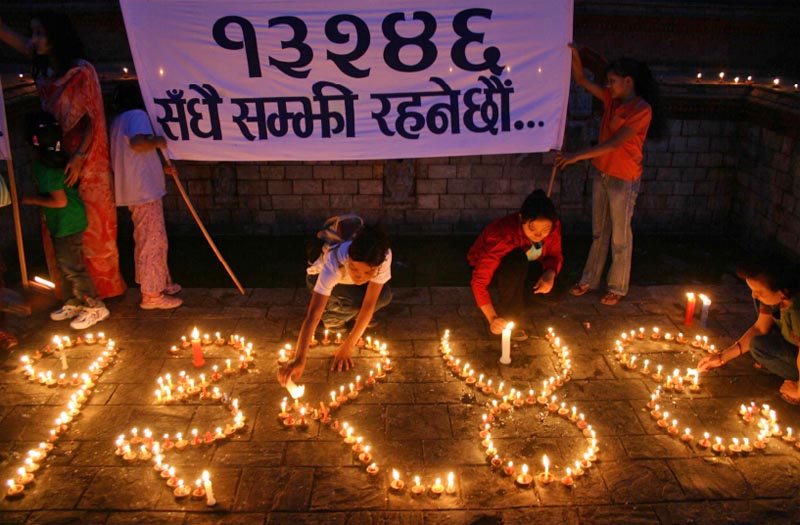Day of the Disappeared: South Asia's torturous wait for the missing
NEW DELHI/KATHMANDU: Shova Bhatta vividly remembers the morning 16 years ago, when five men came to her grocery shop on the outskirts of the Nepali capital and took her husband Shyam.
"They asked him to accompany them and promised that he would be back after answering some questions," said Bhatta. "My husband told me not to worry and that he would return soon because he had not done any harm to anyone."
But 29-year-old Shyam never came back.
His wife insists he was kidnapped by Maoist rebels fighting to topple the feudal monarchy during the Himalayan nation's decade-long civil war which ended in 2006.
The mother of two is left in limbo, fluctuating between the hope of seeing him alive and the agony of believing he is dead.
"I still don't know if they killed him. I don't know if he is still alive," she said. "If he is dead, I want his body as proof so I can carry out our traditional last rites."
Hundreds of thousands of families around the world on Tuesday marked the "International Day of the Disappeared" - aimed at drawing attention to people gone missing amid conflict, disasters, migration or state oppression.
Despite the vast numbers of missing, humanitarian workers say scant attention is given to the plight of their families who spend years seeking the truth.
"This is a tragedy affecting millions, but it remains vastly unacknowledged and underreported. Such indifference is extremely disturbing," said Peter Maurer, president of the International Committee of the Red Cross (ICRC).
"Disappearances are often a sensitive social and political issue, but that is no excuse for inaction. Governments must generate the political will necessary to provide answers."
CHILD SOLDIERS, MIGRANTS, PRISONERS
There are no accurate figures on the number of people missing but the ICRC, which works in more than 60 countries, estimates there are likely hundreds of thousands of victims.
They include combatants missing in action and children separated from their families when fleeing their homes or forced to join armed groups as well as prisoners and migrants.
The numbers of missing people is high in South Asia, which includes Afghanistan, Pakistan, Sri Lanka, India, Bangladesh, Nepal, Bhutan and the Maldives and is home to one fifth of humanity, say activists.
The region is vulnerable to earthquakes and floods which force hundreds of thousands from their homes annually, and it has witnessed violent conflicts.
These include Sri Lanka's 26-year-long war pitting ethnic Tamils against state forces, a crackdown by India forces on people in the disputed region of Kashmir and alleged state violations against people in Pakistan's Baloch region.
There are also disappearances of political activists, human rights defenders, journalists and lawyers who criticise or voice dissent against regimes, corporations or other powerful players.
This month, rights groups accused Bangladesh of illegally detaining sons of members of two main opposition political parties. Authorities claim they do have no knowledge of the disappearances.
Bangladeshi rights group Odhikar says 287 people have disappeared after being picked up by men claiming to be law enforcement over the last seven years. Of these, 38 were found dead, 132 surfaced alive and the fate of 117 people remains unknown, it said.
MISSING YOUNG MEN
In Wunigam village in Indian administered Kashmir's Bandipore district, Hajra Begam, 70, hopes her missing son Bashir will knock at the door one day.
"When my son was taken by the army from his bakery, he had still had flour stuck to his hands," said Begam, adding she and her husband were dependent on Bashir's earnings.
"The army told us later that he ran away from their custody, but we don't believe them. The army did not take only our source of living, but also our Bashir."
According to activists, more than 8,000 people have gone missing in this volatile region bordering Pakistan, where security forces are battling a separatist insurgency.
Almost all young men, they include militants, former militants, civilians and Kashmiris working for security forces, activists say.
Families gather every year to mark the International Day of the Disappeared, said Parveena Ahanger, founder of the Association of Parents of Disappeared Persons (APDP), whose son went missing in the early 1990s.
"It gives us some solace when many of us get together and listen to each other."
LACK OF POLITICAL WILL
Experts say there is a lack of political will to address the issue, often because governments are implicated and investigations can be biased, flawed and lengthy.
In Sri Lanka, some 65,000 people are missing from its civil conflict with separatist Tamil Tigers which ended in 2009 as well as a Marxist insurrection between 1987 and 1989, according to government figures.
The government has set up an office to investigate but families accuse Colombo of not doing enough.
In Nepal, almost 1,400 people are missing, says the National Network of the Families of the Disappeared and Missing, accusing both state forces and Maoist rebels of committing abuses.
The war ended in 2006 under a United Nations-brokered peace deal in which both sides agreed to address war crimes within six months.
The government only established two panels last year to investigate disappearances. The panels have collected thousands of complaints and have until February to finish their work.
"I am in total confusion about his fate," said Ruby Shrestha whose husband went missing more than 13 years ago. "I don't think he is alive. But there is no evidence of his death either."
Humanitarian workers say governments must step up their responses, develop legal frameworks and procedures to account for the missing and provide support to families.
"Those with influence and in a position to help should take the opportunity of the International Day of the Disappeared to recommit themselves to this issue," said Maurer.
"To remain in the dark, not knowing what has happened to someone you love," Maurer said. "Imagine the pain this must cause."
Updated with correction






